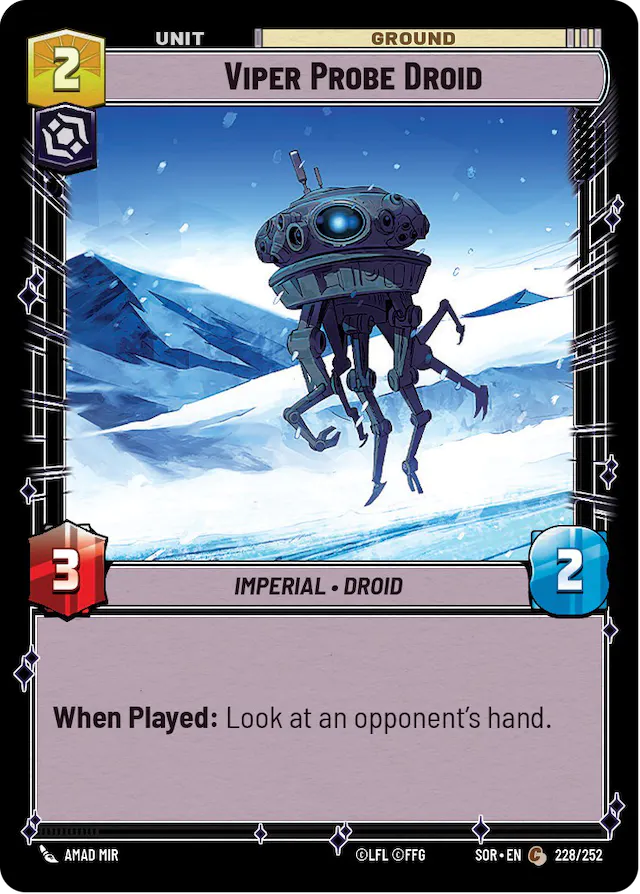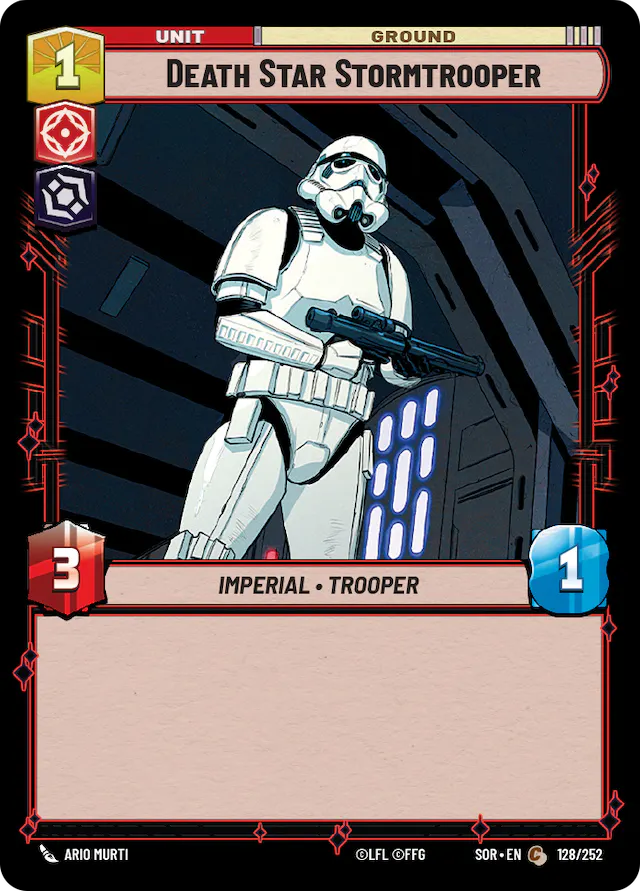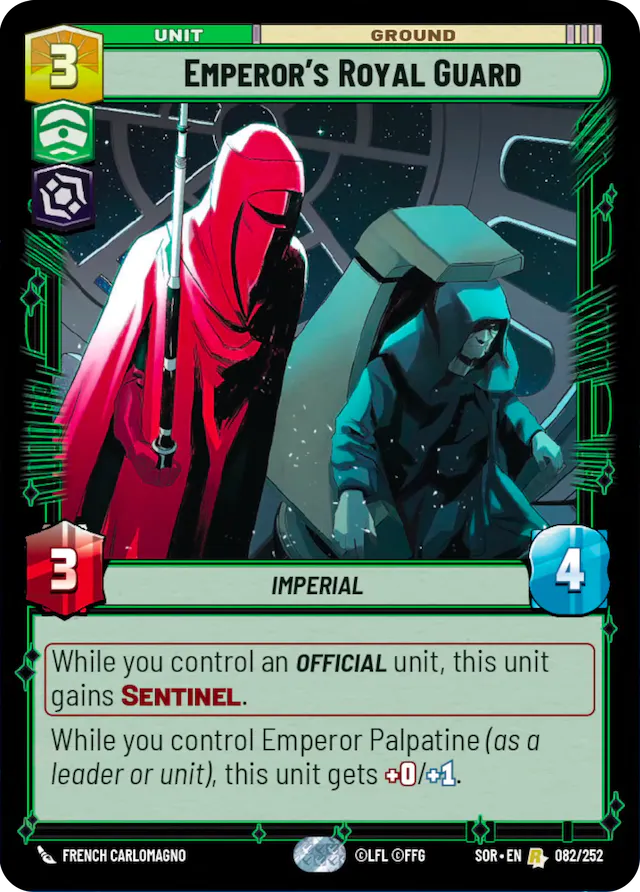Uniqueness in Star Wars: Unlimited
Unlimited's uniqueness rules have been announced, and they've sparked a lot of discussion. So what's the deal with this whole uniqueness thing anyway?
FFG's recent live stream about casual organized play also featured a discussion about the rules for uniqueness in Unlimited, which has set off a huge discussion in the community. In this article, I will explain the uniqueness rules, the design reasoning behind them, as well as give my case for why I like them and explain the arguments against them.
First, I want to thank FFG for taking the time to answer the community's questions about uniqueness and give an in depth explanation of their design choices. It would have been very easy for them to ignore the question or just give a simple answer, but they went out of their way to give the community a full answer. I'm definitely taking notes of that, and I'm sure many others are as well.
Uniqueness Explained
In Unlimited, some cards are unique. Thematically, this means they are a unique version of a named character, item, location, vehicle, or something else that there's only one of. Mechanically, this means that each player can only have one copy of a unique card in play at a given time. What's special about Unlimited's uniqueness rules is that uniqueness applies at the level of subtitles, not titles. This means you can play multiple versions of the same character so long as they are different cards. For example, you can play Leia Organa - Defiant Princess while you also control Leia Organa - Alliance General. However, you couldn't play two copies of Defiant Princess.


It's also worth noting that subtitle does not necessarily mean "version of a card." In theory, FFG could print another card called Leia Organa - Defiant Princess that had a different effect and different stats than the current version, and you could play both of them at the same time.
If you take this rule to the extreme, it means in theory you could see 8 or more versions of Darth Vader on the field at the same time. While this is obviously an extreme hypothetical that likely would never happen, some people think the concept of multiple versions of a character appearing at the same time breaks the theme of the game. FFG knows this is a risk, but decided to go with this rule anyway. We could guess why, but they were actually nice enough to tell us exactly why.
FFG's Reasoning
The first point that FFG made in defense of the rule was that traditional uniqueness rules made the most iconic leaders actively worse. For example, if there's a very powerful Luke Skywalker unit, the value of playing Luke as a leader is a lot less. This is not a desirable circumstance if we care about thematic deck building.
Second, traditional uniqueness rules hurt players that love to play their favorite character. The example used in the live stream was Kanan Jarrus. If a player really likes to play Kanan decks, they'd probably want to use a hypothetical Kanan leader. Under traditional rules, that player would be very sad if the opened a very good Kanan unit in a pack because it would mean they would have to pick which Kanan to use. This scenario is not desirable if we want casual players to feel welcome and be able to enjoy playing decks based around their favorite character.
Third, the new rules allow for a greater design space when it comes to using creative titles. For example, Emperor's Royal Guard buffs itself when you control Emperor Palpatine specifically. This doesn't work with a hypothetical Senator Palpatine card. If we stuck to traditional uniqueness rules, we would be in one of several bas situations. Either we could keep the creative titles and simply write text on the card that prevents Senator Palpatine from being played with Emperor Palpatine, lose the creative titles entirely and have the Royal Guard apply to every character named Palpatine which wouldn't be thematic, or we would lose the design space.
FFG also talked about how the rules make sense within the existing thematic structure of Unlimited’s gameplay. The game is already abstract in several ways. It allows you to play with characters from different eras, play decks with characters that would never work together, and have two of the same character fight each other. Basically, having Rey and Count Dooku fight each other isn't much different from having Kanan with his eyesight and Kanan without his eyesight in play at the same time.
The Case Against the Uniqueness Rules
There are two primary arguments against Unlimited’s uniqueness rules. The first one is probably obvious: it’s weird for a lot of people to see multiple versions of the same character on the same side of the table at the same time. Most of the other thematic rules that Unlimited breaks are easy to get over, but, so the argument goes, having two of the same person is a much harder hurdle to jump. Even if there’s no logical reason to care about strict uniqueness when something like era-crossing is a thing because they’re already accepting something that would be impossible in the star wars universe, the argument is that people will feel like it’s weirder to break uniqueness and thus won’t be interested in the game.
The second argument is that having strict uniqueness creates more choices in deckbuilding and gameplay, and thus a better experience and a more balanced game. Imagine there are two very good Darth Vader units. Under strict uniqueness, you could only have one of these in play at a given time, which means the second one is a dead draw if you already have the first one in play. In this scenario, you would be forced to decide if you want to include the second Vader in your deck and risk drawing it when it’s dead. In the Unlimited rules, you don’t have to worry as much about dead-drawing the second Vader because having the first doesn’t prevent you from playing it. The argument goes that strict uniqueness helps the game in this scenario, because it leads to more creative deckbuilding, and if both Vaders are powerful it creates a natural check on both of them.
So Who’s Correct?
At this point, I’m going to make my argument for the Unlimited rules. This is what I fully believe. If you disagree, feel free to reach out to me on discord if you want to discuss further.
First, the positive arguments that FFG made about design space and encouraging people to play iconic characters seem obviously correct. If anyone wants to dispute them be my guest, but these two things almost certainly make the game better/more appealing to at least some people. The main question is whether there are any drawbacks that outweigh these face-value benefits. This is where the counterarguments above come into play.
In my opinion, the main argument that matters here is the first one: the perceived weirdness of having two of the same character at the same time leading to people not picking up the game. The argument about choices makes sense on its face, but let me show you a different perspective. Imagine if FFG announced they were creating a new restricted list. You can only have one copy of a card from this list in play at a time. Basically it works the way uniqueness does in a game like Destiny. On this list is Imperial Interceptor, Viper Probe Droid, Emperor's Royal Guard, and Death Star Stormtrooper.




From a perspective of choices, this is literally the same thing as strict uniqueness, by design. However, these cards are all very disconnected from one another. It doesn’t really make sense for these cards to be restricted in this way. Now imagine that all four of these cards were named “Jabba the Hutt.” Now it starts to make sense to more people that they would be restricted.
My explanation for this phenomenon it that there’s not an obvious gameplay related reason why these cards shouldn’t be allowed to be played at the same time. While it does create more choices in deckbuilding to have them restricted, these characters can all coexist just fine. Restricting them, while increasing choices, would reduce how much each individual card on the list got played while not providing an obvious benefit balance-wise. Basically, there’s an opportunity cost to increasing choices in this way.
If it did become a problem for any of these cards to be played together(say people were using Viper to look at an opponents hand to see what space units they had so they could time their interceptor perfectly and this was too good for some reason), a solution could be implemented that takes care of that. It’s not obvious on its face that we need to restrict these cards in this way for gameplay reasons. If this makes sense to you, remember that it’s the exact the same as strict uniqueness.
Basically, the argument about choices is sort-of correct, but could be equally applied to literally any combination of cards. This leaves us with the argument about thematic intuition. In my opinion, this is where the fundamental argument lies.
If you recall, the argument is that x number of players will not play the game because they see it as weird to have multiple versions of the same unique character on the same side of the field at the same time. You should also recall the argument from FFG’s stream that y number of players will not play the game because they get punished for trying to a build a deck around their favorite character. Both x and y are almost certainly positive, meaning that some amount of players will not play the game as a result of FFG’s decision, regardless of what that decision is.
So which is greater, x or y? Will more people not play the game if FFG adopts strict uniqueness, or the loose uniqueness that Unlimited uses? That’s an empirical question that there’s no easy answer to right now. However, if we assume that FFG is a rational economic actor and has some process for better determining the answer to that question(we don’t actually have to assume this we know it. on stream they mention how they solicited feedback from both playtestsers and internal channels), we can use the choice they made to get more information. Given that FFG decided to implement the rules they did, it seems like they made the judgement that y was greater than x.
If you disagree with FFG’s judgement, you should consider why FFG made the choice they did given they have access to more resources than the presumably random person that’s reading this. Also, keep in mind that FFG is selling this game to a global market, and has years of experience selling games this way. If your local group is weirded out by the uniqueness rules, remember that FFG talked to several people who had similar feelings during the design and playtest process and still made the choice that they did.
Also, keep in mind the difference between Unlimited and other games, like Destiny or X-Wing. The way those games play emphasizes the characters differently, and this will change how people respond to uniqueness rules.
Conclusion
I’m a fan of the way Unlimited is doing uniqueness. Because of them, we will see iconic characters shine in the way they deserve to, as both leaders and units. We will see casual players get to build around their favorite character in a way that’s rewarding. The game will feel very much like star wars. There may be some weird moments where you have eight copies of Darth Vader out at once, but it seems like this will not have as much of impact on the player base as some might think. From a gameplay perspective, different versions of the same character will likely serve different roles, and restricting them unnecessarily isn’t obviously good for the game even if it would create more choices in deckbuilding. If balance issues do arise from these uniqueness rules, there are still other ways to fix them.
You might say that this way of doing uniqueness makes the game more unlimited.
Thank you for reading, and if you enjoyed the article please consider subscribing to us on Substack for free.





